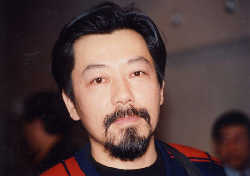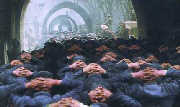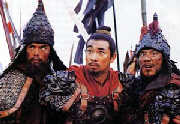
Born in 1953, Wu Ziniu is native ofLeshanDistrict in Southwest China'sSichuan Province. He entered Leshan's art school in 1972. After graduation, he joined the local song and dance ensemble, both creating pieces and performing. In 1978, he passed the entrance examination toBeijing Film Academyand studied in the Director Department, during which he also published some novels.
After his graduation in 1982, he became a director in Xiaoxiang Film Studio, where he directedThe Candidate, his first film that reflects the interests and delights of children's life of that time. In 1984, he acquired the Fourth Golden Rooster Award, China's leading film award. In 1988, he directed three movies:Between Life and Death, Evening Bell,andTo Die like a Man, which helped him take home the Ninth Golden Rooster Award in 1989. Among the three works the most well known isEvening Bell, which won the Silver Bear Award at the 19th Berlin International Film Festival in Germany.
Generally, the most representative of Wu's works are those with the theme of war and peace, such asDie Xue Hei Gu (Blood-shedding Black Valley), Evening Bell, Between Life and Death, Evening Bell, To Die like a Man, and Don't Cry,Nanjing(Nanjing 1937).
All of those works embody Wu's thoughts on war, the relationship between human and war, and his desire for no more wars, as well as his longing for peace.
 |
|
Don't Cry,Nanjing
|
The movieDie Xue Hei Gudemonstrates the spiritual and psychic struggles of people when facing death in the face of wars. With courageous sincerity,Evening Bellexpresses the scars left by war.Don't Cry, Nanjingnot only simply portrays the bloodiness and cruelty of the Japanese invaders, but also sheds light on the damage of war towards the peoples of both China and Japan.
In 2001, Wu made the movieHero Zheng Chenggong, which portrays the life of the 17th-century Chinese general Zheng Chenggong who drove the Dutch fromTaiwan. The film, known as the Chinese edition of Braveheart, is a tale about faith and belief, loyalty and betrayal.
In 1999, Wu directedNational Anthem, which is about the life ofTian Han, the lyric writer of the Chinese national anthem. Like many patriotic intellectuals and artists in the 1930s, screenwriter Tian Han passionately opposed the Japanese occupation of Northeastern China, and directed a series of films that were regarded as part of the "golden period" of Chinese cinema. ForChildren of the Revolution, Tian wrote the patriotic song "March of the Volunteers," which inspired a nation. In 1949, the song became the national anthem.
 |
|
Hero Zheng Chenggong
|
Wu'sSparkling Foxis a modern tale about a somewhat absurd friendship. When a city-weary and jobless film projectionist moves to the woods to rediscover himself by hunting for the legendary sparkling fox, he finds himself competing against a hostile peasant hunter seeking his fortune by hunting for the very same animal. Together, they gradually find something truly meaningful. The film won the International Jury Special Nomination Award at the 44th Berlin International Film Festival in 1994.
Besides the movies, Wu has also directed a number of TV series that are also very influential in China.
Author: Jeff
